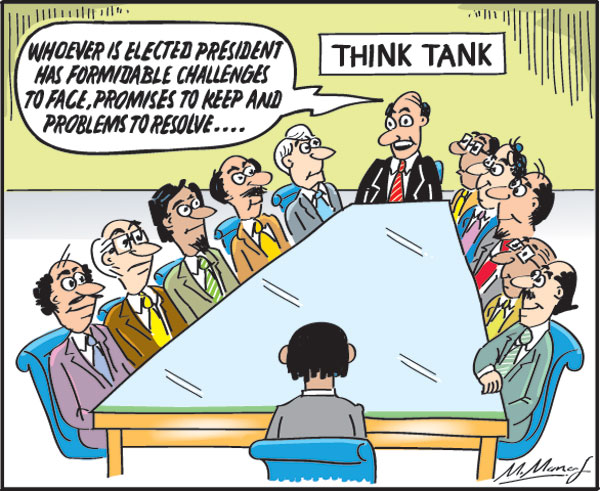Columns
Formidable economic challenges for the president elected today
View(s):Whoever is elected the ninth executive president of the Democratic Socialist Republic of Sri Lanka will face unprecedented challenges, including formidable economic challenges. The recovery of the economy from its current fragile state has been compounded by the extravagant promises given in the election manifesto of whoever is elected president. The next executive president and the next government will face unprecedented economic challenges.
The president elected today and the next government to be elected at the parliamentary elections have immense challenges to face, promises to keep, and problems to resolve.
Election
The outcome of the presidential election will hopefully not result in a stalemate. The electoral history of the country lends hope to a peaceful transition of regimes.
Three features
Three broad features of the country’s electoral history lend hope to a peaceful election. These are that Sri Lanka’s electoral history has seen democratically and peacefully conducted elections; a sweeping victory for a candidate at most elections; and the defeat of the incumbent and party.
Transition
There has been a peaceful transition of power at most elections. This regular peaceful transition of power has drawn the admiration of democratic countries. Hopefully, this feature of our democracy would not be tarnished after either of the elections.
Prerequisite
Law and order and peaceful elections are prerequisites for the country’s economic development. A peaceful transition of power is vital for the country’s economic stability and growth.

Economic issues
The economic problems to be resolved are formidable. Containing the fiscal deficit while reducing taxes and increasing expenditures on salary increases, expanding social security, fertiliser subsidies, and other assistance is indeed impossible financially.
Promises
Promises made cannot be kept fully. Yet, it would be prudent and politically mandatory to implement some to keep the confidence in the government elected by the people.
The president must move towards accomplishing some of the promises, such as the reduction in taxes and the costs of living. These are tough tasks to perform in the financial bind the country is in, but politically imperative. Therein lies the massive financial impasse.
Expectation
A key expectation of the people who have voted the new president into office is an increase in wages, a reduction of prices, and the amelioration of the poor. The winning candidate, whoever that is, has the immense task of fulfilling the promises. This is a near-impossible promise to keep in the financial bind the country is in. How will this be done in the coming months?
IMF
An immediate challenge would be how the IMF arrangement could be continued with some modifications that would give relief to the people going through hardships. This is no easy task, as revenue would have to be increased in an acceptable manner to be able to give relief to low-income earners and the poor, who have been badly affected by increases in prices, reduced employment, and inadequate wages.
Important
On the other hand, the IMF’s Extended Fund Facility should be continued to bolster international confidence and attract foreign investments. If the president elected today chooses to ask for more than what the IMF could agree to, there is a prospect of the 17th IMF arrangement going the way of the previous ones.
Corruption
A formidable challenge for the new president and the government to be elected is the eradication of corruption. One of the main causes of the economic crisis was the country’s pervasive corruption. While eradication of corruption is not a realistic goal, the reduction of big-scale corruption is mandatory.
Recommendations
IMF recommendations on good governance are based on its diagnostic report, and they should be implemented. Much of the economic future of the country’s future lies in minimising corruption.
Other countries
The countries that have grown have done so because of their incorruptible rule. Singapore, Hong Kong, and Costa Rica are among those economies that progressed by leaps and bounds owing to their incorruptible regimes.
Turning a new leaf in eradicating corruption will be the most challenging task, though a necessity.
Unity
Another essential prerequisite is the forging of national unity. Most parties have vowed to unite the country on the basis of equality for all communities. Hopefully, meaningful steps will be taken towards the unity of the nation, which is essential for economic development.
Privatisation
Another problem facing the government is the issue of privatising state-owned enterprises. Most parties are opposed to the privatisation of national assets. Without privatisation, it is unlikely that the fiscal burden could be reduced, nor can the economy grow rapidly.
The NPP, in particular, and the SLPP are opposed to privatization. How this requirement of the IMF could be overcome remains to be seen were they to win the election.
SJB
The SJB is for selective privatisation as well as partial privatisation with private ownership and management and a government stake. This is to ensure more efficient and profitable enterprises that are not a burden on the public finances.
Conclusion
The challenges facing the president and the government are enormous. The promises made at election time make the task even more difficult.
Whoever takes over the government should think anew and formulate a plan and programme for economic development that is realistically possible given the financial bind the country is in.
The government must develop a short-term economic development strategy that could be implemented while having a long-term vision for the country.
We have reached a turning point in the nation’s future. Reform or perish.
Buying or selling electronics has never been easier with the help of Hitad.lk! We, at Hitad.lk, hear your needs and endeavour to provide you with the perfect listings of electronics; because we have listings for nearly anything! Search for your favourite electronic items for sale on Hitad.lk today!


Leave a Reply
Post Comment